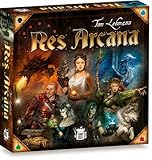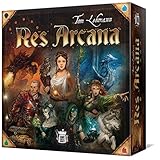
Two-four alchemical mages vie for control of ancient monuments and Places of Power. As a mage, use your magical essences and items to build artifacts, activate their powers, and command dragons. The mage with the most points wins!
Each mage begins with 1 of each essence, 3 artifacts in hand, and 1 magic item. During a round, you'll collect essences and then do 1 action each turn, until everyone passes. The goal is to have the most points, 10 or more, when victory is checked.
Components

- 40 Artifact cards
- 5 Places of Power
- 10 Mage cards
- First Player token
- 10 Monument cards
- 8 Magic items
- 150 essence tokens
- 12 "5x" essence chips
- 4 reference cards
- Summary tile
Mages and items are chosen during setup and begin in play. Each round, when a player passes, they will turn in their item for a new one.

Each player has a personal deck of 8 artifacts, 3 of which form their initial hand. Artifacts are put into play by paying their placement cost in essences. Some artifacts are also Dragons or Creatures. A few artifacts are worth points.

Monuments and Places of Power are claimed from the center by paying their placement cost in essences. Once claimed, a monument or Place of Power cannot be taken by another player. Monuments and Places of Power provide the majority of players' points.

Components with Collect abilities provide essences at the start of each round.

Many components have 1 or more powers. Powers have both a cost and an effect. Many costs include turning that component; once a component is turned, its powers, except for certain "React" powers, cannot be used.
At the end of each round, victory is checked. If no player has won, components are straightened and play continues with a new round.
Which mage will best use their artifacts, magic items, actions, and essences to earn 10+ points and win?
Setup

1 Put the 8 magic items, tray of essences, and 5x essence chips in the center to form the supply.
2 Next to them, set out the 5 Places of Power. First Game: use their  sides. Later games: for each Place of Power, randomly select which side to use.
sides. Later games: for each Place of Power, randomly select which side to use.
3 Shuffle the monuments. Set out 2 of them face up and form a draw pile with the rest.
4 Give 1 of each essence (including Gold) to each player, to form their initial essence pools.
5 Select a First Player, who takes the First Player token.
(). Shuffle the mages and artifacts separately. Deal 2 mages and 8 artifacts to each player. Return the others to the box. Each player examines their cards.
Tip: Do you have dragons, creatures, or ways to make gold? This may suggest Places of Power that will work well for you or if you can buy several monuments.
After examining their cards, each player shuffles their artifacts to form their deck, offering it to an opponent to cut, and then draws 3 artifacts as their initial hand.
Each player then selects 1 Mage. Reveal them. Return unused mages to the box.
First Game: instead, give each player a preset 3-card hand, labeled 1 / 2 / 3 / 4 in their lower right corners, and the matching mage. Deal 5 artifacts face down (unseen) to form each player's deck.
7 In counter-clockwise (reverse) order, starting with the player to the right of the First Player, each player chooses 1 magic item. Begin play with the First Player.
Game Play
A game typically lasts 4-6 rounds. In each round, do these steps:
-
Collect Essences:
- do any Collect
 abilities, and
abilities, and - may take essences from components.
- do any Collect
-
Do actions, 1 per turn, clockwise from the First Player:
- place an artifact,
- claim a monument or Place of Power,
- discard a card for 1 Gold or any 2 other essences,
- use a power on a straightened component, or
- pass: exchange magic items and draw 1 card. Continue until all players have passed.
Pass procedure:
- if you are first to pass, take the First Player token,
- swap your magic item for a different magic item,
- draw 1 card.
-
Check victory (10+ VPs).
If no one has won:
- straighten all turned components, and
- begin the next round.
1. Collect
Each player does their Collect abilities and/or takes essences from their components (in any order).
A component is an artifact, mage, magic item, monument, or Place of Power.
For each Collect ability  on your components, take from the supply the essences shown' and add them to your essence pool:
on your components, take from the supply the essences shown' and add them to your essence pool:
If an essence has a number, take that number of that essence from the supply; otherwise, take 1.
If "+"s separate the essences, take all of them.
If "/"s separate the essences, choose 1 of them.
If a number of
 is listed, choose any mix of essences that equal that number, subject to any restrictions after this symbol, such as (
is listed, choose any mix of essences that equal that number, subject to any restrictions after this symbol, such as ( ): no Qold or Death.
): no Qold or Death.
Players may also take any essences on their components during this step.
You may take essences off some components and not others, but if you take any essences off a given component, you must take all of them.
Fine Points

The essences supplied are not a limit. As needed, put an essence on a "5x" essence chip to be 5 essences of that color. You may make change at any time.
Some components (e.g. Cursed Forge) list a Collect cost and an effect which occurs if this cost is not paid. These may be resolved after taking other essences.
Two artifacts, the Vault and Windup Man, produce effects if you choose to leave all their essences on them. See page 10 for details and examples.
You may take all the essences from a Place of Power (but doing so will result in a loss of victory points).
Players usually collect their essences simultaneously, but may request that this step be done in player order, clockwise, starting with the First Player.
2. Actions
Starting with the First Player and continuing clockwise, each player does 1 action until all players have passed. A player who passes cannot do an action later in this step.
Actions:
-
Place an artifact from your hand in front of you, paying its cost.
-
Claim a monument or Place of Power from the center, placing it in front of you and paying its cost.
As all monuments cost 4 Gold, you may claim either one of the two monuments on display or the top card of the monument deck. If you claim a monument on display, replace it with the top card from the monument deck (if possible).
Once claimed, a monument or Place of Power can not be taken by another player. The supply of monuments and Places of Power is limited.
-

Discard an artifact from your hand to gain 1 Gold or any 2 other essences (either the same or different).
Tuck a discarded artifact sideways, face up, under your artifact deck (to distinguish your discards from your turned artifacts). Your discards may be inspected by other players at any time.
Tip: Do not try to place all of your artifacts. Instead, discard some of them to gain the essences needed to place the others.
-
Use a power on one of your straightened components (see page 7). Powers on turned components cannot be used (except some React powers).
A component is an artifact, mage, magic item, monument, or Place of Power.
-
Pass, ending your actions for this round.
Cost
A component's placement cost is shown in its upper left corner. Pay the essences shown to the supply.

If an essence has a number, pay that number of that essence to the supply; otherwise, pay 1.
If the essence is  , pay any essence. If it lists a number, such as
, pay any essence. If it lists a number, such as  , pay any mix of essences equal to that number.
, pay any mix of essences equal to that number.
Some artifacts are also Dragons ( ), Creatures (
), Creatures ( ), or both (the Sea Serpent). Some discounts reduce the cost to place any artifacts, while others only reduce the cost to place Dragons.
), or both (the Sea Serpent). Some discounts reduce the cost to place any artifacts, while others only reduce the cost to place Dragons.
All placed or claimed components begin play straightened.
Fine Points
Two artifacts (Magical Shard, Prism) have a cost of "0"; they may be placed for free (as an action).
Tip: As artifacts can instead be discarded from hand for essences, there is still an implicit cost to place them.
Discount abilities that reduce a placement cost (Artificer, Dragon Bridle, Dragon Lair) are cumulative with each other and possibly a power (Crypt, Dragon Egg, Sorcerer's Bestiary) being used to place a component. If a cost is reduced below 0, it becomes 0.
Powers
Many components list 1 or 2 powers. Powers have a cost and an effect, separated by a triangle.

To use a power, pay its cost (putting any essences spent in the supply) and apply its effect (taking any essences gained from the supply).
A power's cost often consists of several parts, separated by "+"s. You must pay all of its cost to use a power.

A power may require turning its component sideways as part (or all) of its cost. Once a component is turned, unlike abilities, you may not use its powers (except some React powers) until it is straightened.
A power whose cost does not involve turning its component can be used multiple times in a round, but each use of that power is a separate action.

Many effects direct you to put the gained essences on the component, instead of in your essence pool, to be collected on a future round or to become victory points on Places of Power.

A React power is used out of turn, in response to its condition occurring. Using one is not an action. A React power, unlike other powers, can be used if its component is turned sideways, unless its cost involves turning the component (as then the power's cost cannot be paid).
Life Loss
Some effects inflict Life loss  on rivals, except those who have passed. Each rival must lose the indicated number of Life essences from their pool. For each Life essence a rival does not have, they must instead, if possible, lose any 2 other essences in their pool (including Gold).
on rivals, except those who have passed. Each rival must lose the indicated number of Life essences from their pool. For each Life essence a rival does not have, they must instead, if possible, lose any 2 other essences in their pool (including Gold).

Many React powers enable a player to ignore a given Life loss effect. Many powers that inflict Life loss (e.g. Dragons) provide each rival with an immediate React power which, if its cost is paid, enables that rival to ignore the Life loss.
Fine Points
Some effects provide a number of  essences. Choose any mix of essences equal to that number, subject to any restrictions, such as (
essences. Choose any mix of essences equal to that number, subject to any restrictions, such as (  ): no Gold or Life.
): no Gold or Life.

Some powers involve discarding or destroying your artifacts. Discarding is from hand, whereas destroy is to discard from play. Put the card in your discard pile (tucked sideways under your deck). If there are essences on the destroyed card, return them to the supply. A turned artifact can be destroyed (by another component's power).
Some effects direct you to draw a card. If you have no cards in your deck and you need to draw, reshuffle your discards to form a new deck.
Some effects (Divination, Hawk, Oracle) direct you to draw 3 cards from a deck. If there are fewer than 3 cards in that deck (after reshuffling, if it is your artifact deck), draw them all, and then replace/discard that number of cards.
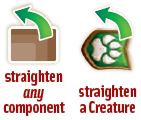
Some effects (e.g. Chalice of Fire, Reanimate, Witch) enable you to straighten a turned component, making its powers available again. The Druid can straighten only Creature artifacts.

Some powers (e.g. Athanor, Philosopher's Stone, Prism) have costs that include some number of essences that must be the same. Their effects convert them all to the same number of a different essence, such as Gold.
If you are the first to pass in a round, take the First Player token - worth 1 point when checking victory - and flip it over to its Passed side.

Some effects direct your rivals to gain essences from the supply. Rivals who have passed do gain these essences.

Some effects (e.g. Hypnotic Basin, Treant) gain essences equal to the number of essences of a rival. You may choose any opponent - including one who has passed - for this effect. Count only the essences in that player's essence pool. Those essences are not removed.

Some effects (e.g. Corrupt Altar, Fiery Whip, Sacrificial Dagger, Sacrificial Pit) produce a mix of essences based on an artifact's placement cost. Total the number of essences in the cost, adjust this by any modifier, and then take this number of essences from the supply, in any mix (subject to any listed restrictions). The essences you take need not include any essences listed in that artifact's cost.
Passing
A player who cannot or does not wish to do an action must pass.
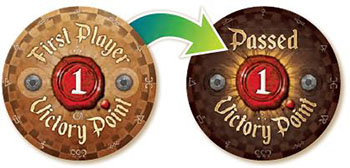
If you are the first to pass in a round, take the First Player token - worth 1 point when checking victory - and flip it over to its Passed side.
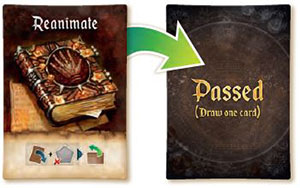
Swap your magic item for a different one in the supply, flipping the new magic item over to its Passed side.
Then, draw 1 card (if possible). If you have no cards in your deck, reshuffle your discards to form a new deck.
Once a player passes, that player cannot do more actions that round and ignores all Life loss, but can still gain essences from rivals' powers.
3. Victory
After all players have passed, check if any player has 10 or more points from their placed artifacts, monuments, Places of Power, and the First Player token.
If at least one player has 10+ points, the game is over and the player with the most points wins!
If several players are tied for most points above 10, then the player among them with the most essences in their essence pool, with Gold essences counting double, wins. If several of these players are still tied, they share their victory.
If no one has 10+ points, straighten all turned components, flip over the First Player token and magic items from their Passed sides, and begin the next round.
Fine Points
Count all Place of Power victory abilities and victory points on turned components when checking victory.
The Places of Power Cursed Forge, Sacred Grove, and Sacrificial Pit each provide 1 or 2 points in addition to their points for the essences on them.
The First Player token provides 1 point for the player who holds it when checking victory.
A player who has claimed the Coral Castle or Sorcerer's Bestiary may use its power to check victory immediately in the middle of a round (to win once they have 10+ points and are ahead, before another player gains more points).
The Golden Statue's React power (to spend 3 Gold for 3 temporary points) may always be used when checking victory, whether or not its owner has passed.
Continue Reading
